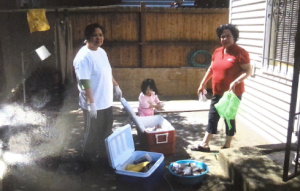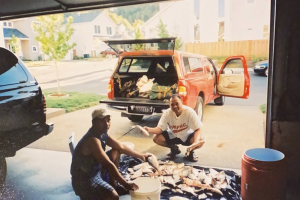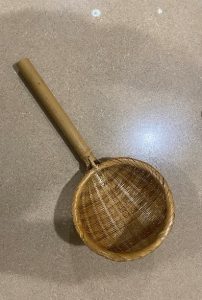Uncle Edwin and Dad’s Story
Later in the 1980’s and 1990’s, my uncle Edwin and dad moved from the Philippines and to Seattle, after a long-term journey of petitions from my grandpa Joe.
Now settling into the workforce in a new country, both my uncle and dad had many different jobs in seeking that sense of stability my grandpa Joe also envisioned. From housekeeping at hotels to canning Salmon (quite full circle) in local Washington factories, my uncle and dad had sacrificed a lot of their own aspirations to make a living abroad. Just like the stories I’ve learned through Knowledge Kapamilya, it is an essentially universal experience for many migrant stories and particularly, Filipinos in Seattle.


However, my uncle and dad managed to seek housing and a lot of support from their fellow Filipino workers at these jobs. In having a chosen family, they were able to go beyond just meeting their necessities abroad and live their lives with people that made them feel a sense of home. Like a family, my dad, uncle, and his friends would scavenge all throughout Washington State (e.g. Kalaloch, Ocean Shores) together which got them to take up hobbies like clamming, squid-jigging, and fishing, which they would later cook or distribute with other friends. In this, I’ve found it interesting to see how these activities operate differently and how pivotal it is in Seattle’s Filipino community for both work and leisure.
Considering aspects of cooking said seafood and general dishes, my uncle and dad have also taken up similar means of my grandpa Buddy in being very meticulous in the kitchen. Though seemingly unnecessary as someone who’s attempted to learn from them, I’ve come to find it is all in good reason, being that they have become designated chefs for my family and fellow Filipino family-friends parties. More particularly, my dad mentioned the process of this Ilocano and Pangasinan dish called “Pinapaitan”, which is bitter goat stew. With the scarcity of this meat and specialty of the dish, I’ve come to see really why my Grandpa, and now my dad and uncle, cook the way they do. Being that they feel obligated and passionate to get these dishes to their best quality, it can honor the recipe back home and respect our fellow Filipinos in the emotional ties they have to the dish. In that, their cooking and especially my dad’s, comes at the very roots of wanting to connect deeper with other Filipinos and generally build community.

Even, in personal aspects of my dad, he’s even began to collect traditional cookware items and work in our local community garden to enjoy the cooking process for himself and deepen that art of cooking. More recently, he’s constructed his own structure to grow plenty of bitter melon, which has become him and my uncle’s specialty every summer. From those said virtues reminiscent of rural parts of the Philippines, he’s found his love for cooking now to extend past the kitchen and dining room but now in the gardens, out fishing, collecting, and generally all pockets of food/cooking culture.
Through my uncle and dad, I can see the value of food and cooking within Filipino identity in finding home in diaspora and bonding with other Filipinos (whether blood-related or not). This value of food and cooking expels Filipino virtues towards community and in the diaspora, it can allow Filipinos to take the survival aspects of cooking and simply become a form of living, connecting with others, and redefining what home can be.

